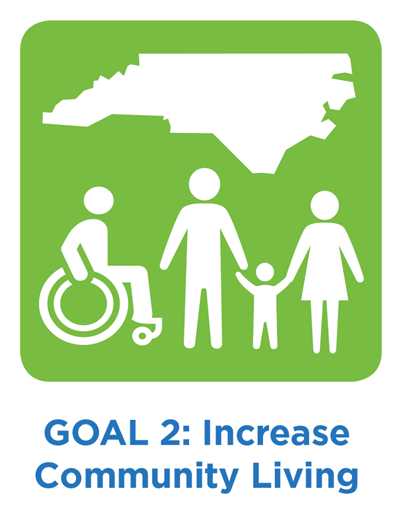Rethinking Guardianship: Building A Case For Less Restrictive Alternatives
NCCDD will fund training, consultation and technical assistance to support the development of policies and practices, relative to guardianship and alternatives to guardianship, that advance integration, productivity, independence, integration, inclusion and self-determination for people with intellectual and other developmental disabilities (I/DD).
Why is NCCDD funding this initiative?
- Guardianship is the most restrictive option of legal substitute decision-making, and continues to increase in North Carolina, specifically for younger adults with disabilities.
- Administrative Office of the Courts reveals of 4,860 incompetency petitions filed, 3,747 resulted in guardianship.
- Recent public guardianship information collected by the Division of Aging and Adult Services (DAAS) reveals that no longer are the frail elderly the majority of people under guardianship in NC.
- Out of more than 5,000 adults served by a public guardian in NC, nearly 3,000 (56%) are younger adults age 18-59 years old, the majority of whom (86%) have a primary diagnosis of intellectual and other developmental disabilities (I/DD) or mental illness.
- Of older adults 60-84 years, who comprise 37% of adults served by public guardians, almost half (48%) have a primary diagnosis of I/DD or mental illness.
- Existing guardianship laws, policies and procedures do not receive uniform interpretation and implementation across the State.
- Recent efforts to address guardianship in NC have focused only on public guardianship issues.
- This initiative supports NCCDD's Goal 2 of the current Five Year Plan: Increase community living for individuals with I/DD.
What are the major goals and objectives?
- Build on 2013 public guardianship efforts and expand discussion to full range of guardianship and its alternatives.
- Use data and stories to build a baseline for shared measurement toward a goal of system improvements and less restrictive alternatives.
- Compile best practices information from experts in the guardianship field and study the actions of states that have successfully implemented less restrictive models of guardianship, as well as models of self-determination and supported decision-making.
- Review existing state data on guardianship determination, tracking individuals, and the processes for ongoing review and re-evaluation.
- Support a more central leadership role by the NC Administrative Office of the Courts (AOC).
What has taken place since the start of the program? (Activities)
- Launch new curriculum and create training opportunities for guardians.
- Evaluate pilot initiative in Catawba County as a step towards a replicable model.
- Interface with child welfare system and the educational system to promote alternatives to guardianship.
- Continue workgroup as ongoing entity that uses the information it gathers from experts, other states and collected data to make recommendations for NC guardianship after this initiative ends.
What has been achieved to date?
- Catawba County pilot demonstrates need for greater data collection to inform changes to be made in guardianship.
- Passage of NC Statue 35B – Uniform Adult Guardianship and Protective Proceedings Jurisdiction Act (UAGPPJA).
- North Carolina now recognized as a WINGS state - Working Interdisciplinary Network of Guardianship Stakeholders – as a result of the work of this initiative.
- Launched a website with resources which can be utilized by families and processionals. See http://ssw.unc.edu/rethinking/home
- Built a knowledge base of best practices by educating and informing the workgroup on alternatives to guardianship such as advance directives; supported decision-making and self-determination and less restrictive models of guardianship adopted by other states.
- Working toward comprehensive reform on NC General Statute 35A during the 2019 legislative session.
Introduced Restoration to Competency forms through the Administrative Office of the Courts in May 2017, which may be used with restoration of competency proceedings under NC General Statute 35A-1130. - Developed the Understanding Guardianship video.
- Completed the brochure Rethinking Guardianship: An Introduction to Options.
What long-term changes are expected as a result of this initiative?
- Build a sustainable infrastructure to effect long-term changes in NC’s guardianship system that respects the rights of individuals in guardianship and those facing guardianship.
- Establish a sustainable plan of court and community support that continually assesses North Carolina’s guardianship system to determine when formal or informal adaptations are needed.
- Recommend amendments to North Carolina General Assembly policies (NCGA 35A) that promote less restrictive guardianship alternatives as appropriate.
- Provide educational resources to make individuals and families aware of the guardianship process and less restrictive alternatives.
How can I get involved?
Contact Linda Kendall Fields at [email protected]
Who is the contractor?
![]()
DHHS Division of Aging and Adult Services
Who can I contact for questions?
Grant Administrator: Kate Walton, [email protected]
NCCDD: Philip Woodward, Systems Change Manager, [email protected]
Additional Resources
Click here to be taken to the Rethinking Guardianship Resource Page
Click here to download a pdf of this initiative.
Click here to read the Third Year and Final Report from 2017
Click here to read the Second Year Report from 2016
Click here to read the First Year Report from 2015